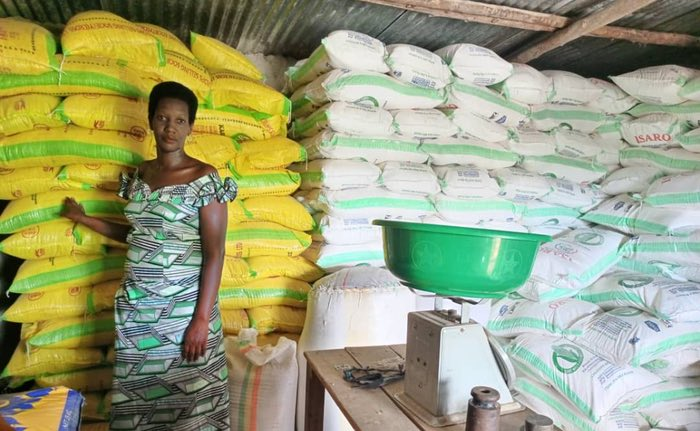
Diane Feza in her shop
By Eric Didier Karinganire
At a grocery store in Kigeme Refugee Camp, Diane Feza is busy weighing food items including flour, rice, and potatoes before handing them to buyers. The Congolese refugee also chats with customers who want to withdraw money through the agent banking system. This is her daily activity to sustain her family’s livelihood in the camp.
“I am now self-reliant, able to pursue my goals independently, achieve progress, and my heart is full of happiness,” Feza says.
The 37-year-old mother is now able to provide for her three children – they are enrolled in a good private school in Nyamagabe District. And she supports the rest of her family to live a decent life.
But things weren’t smooth when she first settled in the camp, situated in the southern part of Rwanda, over a decade ago.
When she arrived there in 2012, she was overwhelmed with responsibilities: caring for her aging mother, supporting her younger sister with a disability, and raising a very young child.
She knew that her family’s survival depended on her ability to create something out of nothing.
“At the time, we were provided with dry maize, but both my aging mother and young child couldn’t eat it. This prompted me to consider trading to earn money to buy other foodstuffs,” Feza says.
Armed with a heart full of dreams, she embarked on her entrepreneurial journey. She was already a community health worker which earned her some incentives.
Starting with a modest capital of Rwf 600,000 from her savings group in the camp back in 2013, along with an additional amount provided by her husband who was still living in DRC, she ventured into selling maize flour and other food commodities. This enabled her to generate some income, which she used to cover basic needs. Despite her efforts, however, challenges persisted.
A lack of working capital was a major hindrance to her business. Having left everything behind while seeking safety, Feza could not access traditional financial resources without providing collateral.
It wasn’t until 2017 that she learned that Inkomoko, one of UNHCR’s operational partners in Rwanda, could provide her with a loan to boost her business.
“At first, they provided me with a loan of Rwf 2 million without requiring collateral, which I paid back well. They extended further loans worth Rwf 5 million, then Rwf 8 million, and so forth,” she explains, adding that access to financial services enabled her to boost her business.
And then came the turning point. Since 2021, Feza has been able to get bigger amounts of loans with 40% of matching grants thanks to Jya Mbere project, which aims at improving access to basic services and economic opportunities for refugees and host communities across Rwanda. The project, funded by the World Bank, is managed by the Ministry in Charge of Emergency Management (MINEMA).
The new opportunity enabled Feza to further expand her grocery and agent banking system business not only in Kigeme but also to open a similar venture in Mahama Refugee Camp—approximately 250 km to the southeast of Rwanda.
What started as a survival venture a decade ago has now grown into a thriving enterprise. And Feza has been wisely reinvesting some of her income. In 2021, for instance, she acquired a commercial house worth Rwf 16.5 million in Musanze District, and she keeps seven dairy cows near Kigeme camp.
Beyond her work along the food distribution chain, Feza remains a source of hope for many; she currently employs seven full-time refugees and Rwandans and the number can sometimes increase up to 20 depending on demands. She was also the first refugee to be appointed to Inkomoko’s advisory board.
“I am very grateful to those who have supported me thus far,” she says, adding that more support is still needed to assist refugees like her as they strive to achieve even greater things.
Despite the declining funding for humanitarian assistance, more refugees like Feza deserve to be supported to rebuild their lives and become financially independent.
In 2023, over $10 million was invested in the refugee livelihoods sector in Rwanda enabling Feza and many more refugees like her to build successful businesses and journey along the path to self-reliance. [Source : UNHCR Rwanda] (End)
